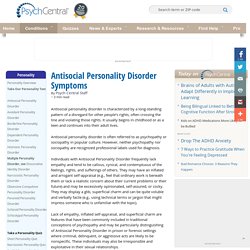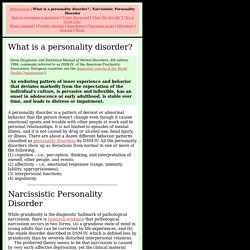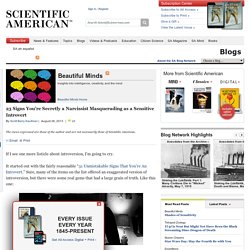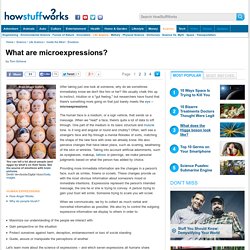

trainerchick71
Avid hiker, fitness trainer, trail runner, camper - used 2 kayak, mt bike and practice yoga - LOVE the outdoors, but am a loner :-)i like my peace and solitude!
The Sixteen Personality Types - High-Level. ISTJ - The Duty Fulfiller Serious and quiet, interested in security and peaceful living.

Extremely thorough, responsible, and dependable. Well-developed powers of concentration. Usually interested in supporting and promoting traditions and establishments. Well-organized and hard working, they work steadily towards identified goals. Click here for a detailed description of ISTJ. ISTP - The Mechanic Quiet and reserved, interested in how and why things work. Click here for a detailed description of ISTP. ISFJ - The Nurturer Quiet, kind, and conscientious. Click here for a detailed description of ISFJ. Antisocial Personality Disorder Symptoms. Antisocial personality disorder is characterized by a long-standing pattern of a disregard for other people’s rights, often crossing the line and violating those rights.

It usually begins in childhood or as a teen and continues into their adult lives. Antisocial personality disorder is often referred to as psychopathy or sociopathy in popular culture. However, neither psychopathy nor sociopathy are recognized professional labels used for diagnosis. Narcissistic Personality Disorder (NPD) : DSM-IV Diagnostic Criteria. What is a personality disorder?

A personality disorder is a pattern of deviant or abnormal behavior that the person doesn't change even though it causes emotional upsets and trouble with other people at work and in personal relationships. It is not limited to episodes of mental illness, and it is not caused by drug or alcohol use, head injury, or illness. There are about a dozen different behavior patterns classified as personality disorders by DSM-IV. All the personality disorders show up as deviations from normal in one or more of the following: (1) cognition -- i.e., perception, thinking, and interpretation of oneself, other people, and events; (2) affectivity -- i.e., emotional responses (range, intensity, lability, appropriateness); (3) interpersonal functions; (4) impulsivity. Narcissistic Personality Disorder Translation: Grandiosity is the hallmark of narcissism. 9 Enlightening Quotes on Narcissists—and Why. 23 Signs You’re Secretly a Narcissist Masquerading as a Sensitive Introvert.
The views expressed are those of the author and are not necessarily those of Scientific American.

If I see one more listicle about introversion, I’m going to cry. It started out with the fairly reasonable “31 Unmistakable Signs That You’re An Introvert.” Sure, many of the items on the list offered an exaggerated version of introversion, but there were some real gems that had a large grain of truth. Like this one: But then this happened: 22 Signs Your Dog’s An Introvert "He often wears headphones with no music playing, in the hopes no one will try and talk to him. " You’d think that’d be enough for a lifetime of listicles. Another common misconception perpetuated by these listicles is that introversion and sensory processing sensitivity are the same thing.
“While extroverts tend to get bored easily when they don’t have enough to do, introverts have the opposite problem — they get easily distracted and overwhelmed in environments with an excess of stimulation.” Really? So here’s the test. Done? Leverage Your Personality Type. “Consciousness Creates Reality” – Physicists Admit The Universe Is Immaterial, Mental & Spiritual. “Consciousness creates reality,” a statement that has gained a lot of attention across various alternative media outlets around the world.

Make no mistake, consciousness has been (for quite some time) studied by numerous scientists, especially in its relation to quantum physics and how it might be correlated with the nature of our reality. What is consciousness? Consciousness includes a number of things. It’s how we perceive our world, our thoughts, being aware, our intentions and more.
“Looking for consciousness in the brain is like looking in the radio for the announcer.” – Nasseim Haramein, director of research for the Resonance Project“I regard consciousness as fundamental. The statement that “consciousness creates reality” comes with a number of different questions. “A fundamental conclusion of the new physics also acknowledges that the observer creates the reality. The Science Behind The Statement “Consciousness Creates Reality” Buddhist Monks Bless Tea With Good Intention. Understanding Borderline Personality Disorder. What are microexpressions? After taking just one look at someone, why do we sometimes immediately know we don't like him or her?

We usually chalk this up to instinct, intuition or a "gut feeling," but researchers have found that there's something more going on that just barely meets the eye -- microexpressions. The human face is a medium, or a sign vehicle, that sends us a message. When we "read" a face, there's quite a lot of data to sift through. One part of the medium is its basic structure and muscle tone. How to Detect Lies - body language, reactions, speech patterns. Interesting Info -> Lying Index -> How to Detect Lies Become a Human Lie Detector (Part 1) Warning: sometimes ignorance is bliss.

After gaining this knowledge, you may be hurt when it is obvious that someone is lying to you. The following deception detection techniques are used by police, forensic psychologists, security experts and other investigators. Introduction to Detecting Lies: Brain. Narcissism. Google.